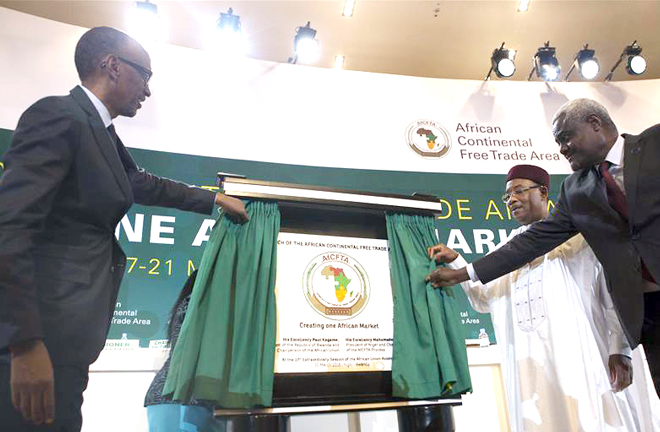B&R strengthens China-Africa ties

The African Continental Free Trade Agreement (AfCFTA) was unveiled in March 2018. Photo: XINHUA
ADDIS ABABA—May 30 is the day when the African Continental Free Trade Agreement (AfCFTA) came into force.
The AfCFTA, which was signed by 44 African countries when launched in Kigali, capital of Rwanda, in March 2018, aspires to create a tariff-free continent that can grow local businesses, boost intra-African trade, spur industrialization and create more jobs.
The pact has been ratified by 22 members of the African Union (AU), which is the threshold needed for the deal to come into force.
On the same day, experts exchanged ideas on China-Africa partnerships under the Belt and Road (B&R) initiative at a symposium in Addis Ababa, capital of Ethiopia.
The symposium, jointly organized by the Chinese Mission to the African Union and the AU Commission, was committed to facilitating the dovetailing between the B&R initiative and the AU’s Agenda 2063 along with the development strategies of African countries.
More than 300 participants held group discussions on China-Africa cooperation in trade, infrastructure and energy under the B&R, also covering the role of entrepreneurs.
Participants agreed that the Second Belt and Road Forum for International Cooperation held in Beijing this April was a success. Africa is an important partner of the B&R. China-Africa joint construction of the B&R will promote mutual benefit and common development, enhancing the bilateral ties.
Participants believed that closed policies will cost development opportunities, and open cooperation is the development path in line with the trend of the times. With reference to Africa’s blueprint for development in the fields of infrastructure, agriculture, industrialization and energy, China and Africa can create opportunities for new partnerships and build a new pattern of transnational and interregional interconnection with high standards, sustainability and benefit to the people.
Through building the African free trade zone, China and Africa can connect the markets on both sides and promote the free flow of goods, people, capital and technology; speed up the dovetailing of policies, rules and standards; and promote the coordinated development of the two sides through practical actions to better maintain the momentum of economic globalization and trade facilitation.
Participants believed that the fourth industrial revolution, characterized by big data, cloud computing and artificial intelligence, is on the rise and that the digital economy has become a new engine for African economic growth. Both China and Africa need to highlight innovation’s role in generating growth, promote the transformation and upgrading of traditional industries in African countries through the B&R, and accelerate emerging industries.
Chinese and African enterprises need to conform to the new trend of economic development in Africa, tap the potential for cooperation, explore emerging markets in e-commerce and the digital economy, and promote the design, investment, construction, and operation and maintenance of the entire industry chain. Bridging the geographical barriers and breaking infrastructure bottlenecks through technological innovation, the two sides can improve the quality and efficiency of their partnership.
In light of both the multilateralism and protectionism in the world economy, China-Africa cooperation under the B&R is particularly meaningful, said Ambassador Liu Yuxi, head of the Chinese Mission to the African Union. Participants generally agreed that Africa is facing economic development and transition and that it urgently needs the support and cooperation of the international community in infrastructure construction, talent and capital. Through this symposium, everyone has realized the need to strengthen China-Africa cooperation in industrialization, agricultural modernization and infrastructure development in Africa.
Liu said that despite the profound changes in the international environment and the increase in uncertainties since the beginning of this year, the Chinese economy has steadily advanced on the road of high-quality development. The pace of China’s reform and opening up will not change despite the tide of counter-globalization, unilateralism and protectionism.
Liu said that China is willing to work with African countries to create policies to provide a sound environment for enterprises to invest and better participate in the construction of the B&R, creating an amiable linkage and cooperation mechanism between the government and enterprises.
This article was edited and translated from Guangming Daily.
edited by JIANG HONG
